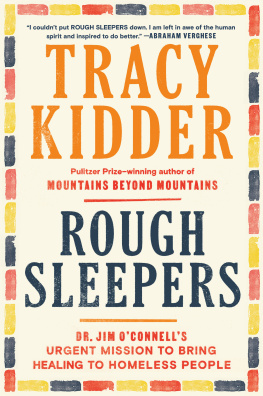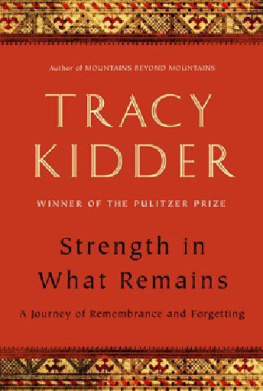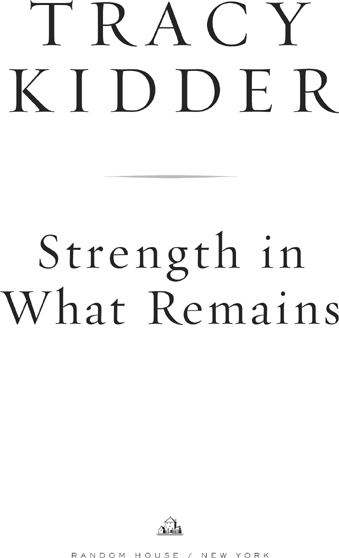Out of what I hope is an excess of caution, I have changed the names of many people and places in Burundi. Goss and Fair Oaks Nursing Home are also pseudonyms.
BURUNDI, JUNE 2006
A s we drove through southwestern Burundi, I felt as if we were being followed by the mountain called Ganza, the way a child feels followed by the moon. The road climbed through deeply folded countryside. We would round a corner, and another broad face of Ganza would appear.
Then my companion, Deogratias, would order the driver to stop. Deo would get out of the SUV and stand on the shoulder of the pavement, aiming his digital camera at the mountain. Deo wore a black bush hat with a dangling chin strap. I supposed that to people passing by, in the crowded minibuses and on the bicycles laden with plastic jugs of palm oil, he must look like a tourist, a trim young black-skinned rich man from somewhere far away.
Standing beside him at the roadside, I could look down on narrow valleys of cultivated fields and up at steep hillsides, some covered with grass, others quilted with groves of eucalyptus and banana trees and dotted with tiny houses roofed in metal or thatch. Above them rose the flanks and the domed top of Ganza, all but treeless, barren of houses. In Kirundi, ganza means to reign, and the name evoked the kings that once ruled Burundi. The little nation, centuries old, straddles the crest of the watershed of the Congo and Nile rivers, just south of the equator in East Central Africa. It is bordered by Tanzania to the south and east, by the Democratic Republic of the Congo across Lake Tanganikya to the west, and by Rwanda to the north. Its a landlocked and impoverished country with an agrarian economy that exports excellent coffee and tea and not much elsea land of dwindling forests that still has lovely rustic landscapes.
Deo could hardly take his eyes off Ganza. He was thronged by memories. All the summers of his boyhood, once a week and sometimes twice, he and his older brother had toiled over the mountain, climbing impossibly steep paths, their knees shaking under the loads balanced on their heads. Back then, the land out there had all been thickly forested, and in the trees and under them he used to see chimps, monkeys, even gorillas. They were all gone now, he said. But there had been so many monkeys then! One time he and his brother sat down to rest partway up another mountain, and a host of monkeys surrounded them, like a gang of little thugs, harassing them, trying to take their sacks of cassava, even slapping them right in their faces! In the end there was nothing for him and his brother to do but run away, leaving the cassava behind.
When he told me this story, Deo laughed. It was what Id come to recognize as his normal laugh. It had the same bright, surprised, near soprano sound as his voice when he greeted a friend and cried out, Hi!, the Hi! drawn out as if he didnt want it to end. His English was accented with French and Kirundi and sprinkled with misplaced emphasesas in, I am laughing when I think about it. And many of his phrases had a certain hybrid vigor, a fresh extravagance: I want to get it out of my chest. Run like a thunderstorm. I had to bite my heart.
Deo grew up in the mountains east of Ganza, in a tiny settlement of farms and pastures called Butanza. He had returned to Burundi several times over the past six years. But he had avoided Butanza. He had not visited it for nearly fourteen years. Now he was going back at last. He seemed happy to see Ganza again, but when we drove farther east toward Butanza, he grew, not silent, but increasingly quiet. One noticed this, because he was usually so talkative and animated.
After a while we turned off the paved road onto dirt roads. The dirt roads grew narrower. Finally, as we bumped along up a steep, rutted track, Deo said we were getting close. He said that when we arrived, we would climb on foot to the pasture where, many years ago, his best friend, Clovis, took sick. We would visit the very spot, he said. Then he added, And when we get to Butanza we dont talk about Clovis.
Why?
Because people dont talk about people who died. By their names, anyways. They call it gusimbura. If for example you say, Oh, your granddad, and you say his name to people, they say you gusimbura them. Its a bad word. You are reminding people Deos voice trailed off.
Youre reminding people of something bad?
Yes. Its so hard to understand, because in the Western world Again, Deo left the thought half finished.
People try to remember?
Yah.
Here in Burundi, they try to forget?
Exactly, he said.
PART ONE

FLIGHTS
ONE
BujumburaNew York,
May 1994
O n the outskirts of the capital, Bujumbura, there is a small international airport. It has a modern terminal with intricate roofs and domed metal structures that resemble astronomical observatories. It is the kind of terminal that seems designed to say that here you leave the past behind, the future has arrived, behold the wonders of aviation. But in Burundi in 1994, for the lucky few with tickets, an airplane was just the fastest, safest way out. It was flight. In the spring of that year, violence and chaos governed Burundi. To the west, the hills above Bujumbura were burning. Smoke seemed to be pouring off the hills, as the winds of mid-May carried the plumes of smoke downward in undulating sheets, in the general direction of the airport. A large passenger jet was parked on the tarmac, and a disordered crowd was heading toward it in sweaty haste. Deo felt as if he were being carried by the crowd, immersed in an unfamiliar river. The faces around him were mostly white, and though many were black or brown, there was no one whom he recognized, and so far as he could tell there were no country people. As a little boy, he had crouched behind rocks or under trees the first times hed seen airplanes passing overhead. He had never been so close to a plane before. Except for buildings in the capital, this was the largest man-made thing hed ever seen. He mounted the staircase quickly. Only when he had entered the plane did he let himself look back, staring from inside the doorway as if from a hiding place again.












